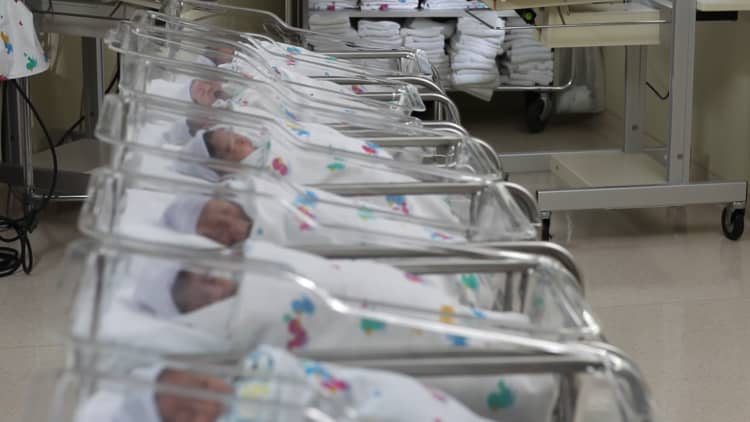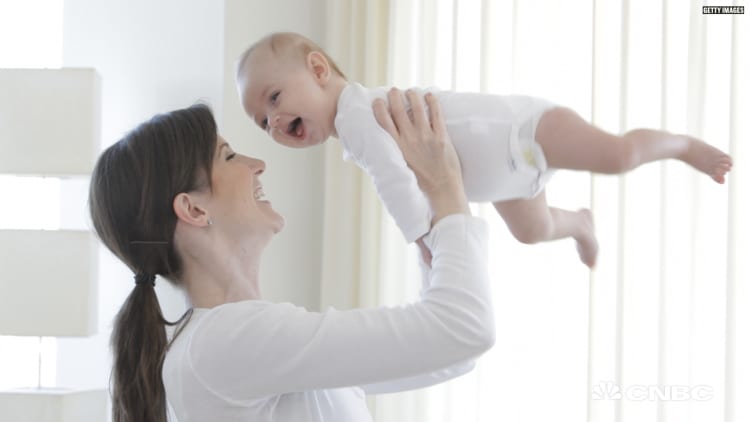It's not news that more and more women are delaying having their first child. What is new, though, are the high-tech options available to a potential parent, or at least to one with means.
Since 1975, the proportion of first births to women aged 30 years and older increased from 5 percent to 24 percent in 2006, according to the Centers for Disease Control & Prevention. In the latest recording period, the average age of first-time mothers jumped to 26. That's up from 21 in 1970.
But as more people try to have children later in life, more also struggle and some find out that they can't. The World Health Organization declared infertility to be the third most serious disease worldwide in the 21st century, behind only cancer and cardiovascular disease.
It's a fact known all too well by serial entrepreneur Martin Varsavsky, who has founded a new, $200 million start-up looking to circumvent the biological realities of a decision that has become increasingly complicated.
"We have a problem that when we are fertile we're not ready and when we're ready we're not fertile," he tells CNBC Make It.
For Varsavsky, it was living that dilemma and struggling to have children with his wife Nina, aged 31 at the time, that led him to launch Prelude Fertility, his eighth company. Varsavsky made the jump from tech into founding a business that he hopes will expand options for parents who wait longer to have children.
Luckily for the Varsavskys, interventions succeeded and led to their third child earlier this year. But the fact remains that about one-third of all couples in which the woman is over 35 will have fertility problems, according to the CDC. A man's age can affect fertility as well. For more than one-third of couples struggling to conceive, a male factor is identified along with a female factor. (Prelude also intends to offer sperm freezing services.)
Varsavsky finds the current failure rate unacceptable. "I mean, we don't fly airlines that fall a third of the time, we don't drive cars that are stalled a third of the time, and [yet] we fail a third of the time at the most important thing in our life, which is to start of family," he says.
Prelude isn't unique in looking to apply developing reproductive technology to help couples conceive. Plenty of fertility clinics around the country offer in-vitro fertilization, and a growing number offer egg retrieval and freezing now, too, since the practice is no longer deemed "experimental" by the American Society for Reproductive Medicine.
The start-up is looking to set itself apart in the growing $4 billion infertility industry, however, by creating a one-stop shop for patients.
Rather than offering hormone injections, egg freezing and storage as piecemeal services, the company is looking to pitch a whole reproductive package, culminating in the transfer of a single, healthy embryo. That should help minimize the likelihood of complications that can arise from conceiving twins or triplets with traditional IVF.
Varsavsky realized the quickest way to achieve his goal would be to use the $200 million raised from private equity fund Lee Equity to buy up already compliant clinics around the country. The shopping spree began with the purchase of Reproductive Biology Associates and the largest egg bank in the country, MyEggBank North America.
"Once you're under the same tent, it's really about sharing the best practices, protocols, and mining data to really improve outcomes over time," explains Prelude CEO Susan Hertzberg. She says that a "double-digit" number of active deals remains in the start-up's pipeline.
But perhaps the largest impact the Atlanta-based infertility startup hopes to make is increasing the focus on younger millennial women. While egg freezing has become a more popular procedure over the last few years, data suggests the procedure is most popular with women in their late 30s. That's past the ideal age for retrieval, according to the Society for Assisted Reproductive Technologies.
Later in life, "the proportion of abnormal eggs to good-quality eggs is significantly higher, which is why the rate of miscarriage goes up [and] the inability to conceive goes up," says Hertzberg.
The difficulty lies in reaching, and convincing, women in their 20s that freezing their eggs makes sense. The procedure is expensive and not widely covered by most insurance plans. Just one round of egg retrieval can cost around $10,000 and $500 a year thereafter for storage.
Hertzberg says, however, that initial market testing in select locations has resulted in demand "each and every time."
The round of in-vitro fertilization that would hypothetically follow years later when a woman is ready to carry a child would on average add an additional $20,000. Hertzberg notes that Prelude offers flexible payment plans.
We fail a third of the time at the most important thing in our life, which is to start of family.Martin VarsavskyPrelude founder
Some companies, notably those in the tech sector, have begun offering to foot the bill for some reproductive services. Apple and Facebook were among the first in 2014 to offer to cover up to $20,000 for employees to freeze their eggs. Other companies like Intel and Yahoo followed suit, around the same time critics started questioning the true message these companies were sending to female employees.
Still, for the vast majority of young women who don't have insurance to cover the cost of egg freezing or an employer offering to foot the bill, it can be a difficult decision.
For 41-year-old Chelsea McMillan, founder of clothing outfitter Sunshine State Goods & Apparel, the choice was made a bit easier. Her childhood friend and billionaire Spanx founder Sara Blakely offered to cover the cost of egg freezing when she heard McMillan joking about unsuccessfully looking for a discount on Groupon.
"I guess I just thought it would happen naturally," McMillan tells CNBC Make It. "I thought, 'Well I'll be able to get pregnant naturally,' but I'm not financially where I want to be yet. I'm still in the early stages of starting my company."
Three years ago, McMillan endured the weeks of hormone injections, medication and blood work before having her eggs retrieved for storage at a clinic now owned by Prelude. On the same day, a younger patient next to her had 17 eggs retrieved, "and I'm sitting there with seven," McMillan recalls.
She acknowledges there's no guarantee that any might result in a child. "You never know, and I'm just glad I have the chance," she says.
That's partially the concern facing those at the forefront of this developing technique, according to SART President Dr. Kevin Doody.
"It's a double-edged sword," he says. "It's a great technology but we don't want to have patients be overconfident that freezing their eggs is necessarily going to equal having as many children as they ultimately want to have."
Citing the data his industry group collects from nearly 95 percent of the country's fertility clinics, Doody says the odds that freezing your eggs will lead to the childbirth are usually about 50-50, at best.
"I think it's safe to say if you were to estimate anything above 50 percent for a less than 35-year-old woman freeing her eggs one cycle that's not just an optimistic but perhaps an overly optimistic projection," Doody says.
Still, younger women could have a better chance, if Varsavsky and others can convince them to take it. That's why, Hertzberg says, Prelude is trying to get the message out that "it's never going to be better, faster, and cheaper to preserve your options for your fertility than if you're in your 20s."
Like this story? Like CNBC Make It on Facebook!
Don't miss: Only 20% of Americans save money regularly—here are 6 easy ways to get started




